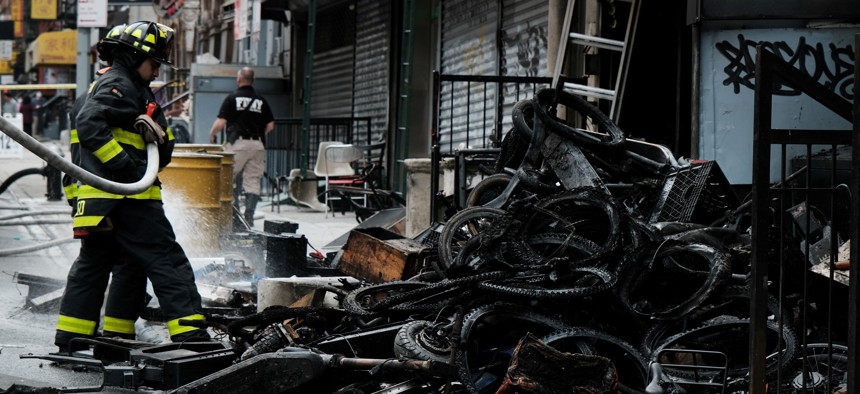Deadly fires from phone, scooter batteries leave lawmakers playing catch-up on safety

Firefighters work outside a building in Chinatown after four people were killed by a fire in an e-bike repair shop overnight on June 20, 2023, in New York City. Spencer Platt/Getty Images
Lithium-ion battery fires move fast, blaze hot and are tough to extinguish.
This story is republished from Stateline. Read the original article.
For a decade, Illinois state Sen. Sue Rezin has recognized the technological and economic potential of lithium-ion batteries. Rezin, a Republican who serves in a district that is a major chemical and energy industry hub southwest of Chicago, also recognizes the possible dangers.
In June 2021, a Morris, Illinois, warehouse in her district with roughly 184,000 pounds of lithium batteries caught fire. The blaze forced a three-day evacuation of the city’s residents and a monthslong cleanup and response effort by the state Environmental Protection Agency.
“I saw what a battery fire looked like up close and personal. It’s unlike any fire I’ve ever seen, from the thickness of the smoke to the hours and hours of fire response,” said Rezin, who is proposing legislation that would ban the disposal of lithium-ion batteries in mixed-recycling bins.
Rechargeable lithium batteries power our daily lives: They’re in phones, laptops, electric scooters and e-bikes. But if they ignite, they burn hot, explosively and with a tenacity that makes them difficult to extinguish.
Those challenges, and a recent rise in lithium-ion fires, have many policymakers across the country filing bills, updating fire codes and passing new housing regulations in an effort to prevent disasters. Fire safety experts are encouraging the changes, but some also warn that state and local legislators are once again playing catch-up.
“There’s a level of complacency among the public and policymakers when it comes to fire safety. If you don’t see anything burning right outside your door, it doesn’t rise to the top of your list of things that you’re focusing on,“ said Lorraine Carli, vice president of outreach and advocacy at the National Fire Protection Association, an industry and advocacy nonprofit.
“These batteries are powerhouses,” she said. “They will continue to evolve in our technology, and we need policies that evolve with it, rather than react to it.”
Lithium-ion battery fires tend to garner a lot of publicity, but experts say there likely are more of them than is commonly known, because fire agencies don’t systematically track them.
Several high-profile, deadly fires in New York City prompted the City Council to pass rules last fall prohibiting the sale of mobility devices and storage batteries that fail to meet UL Solutions safety standards. Still, an e-bike fire at a Harlem apartment building earlier this year injured 17 and killed one, 27-year-old journalist Fazil Khan.
Also this month, San Francisco updated its fire code to limit the number of power-charged personal mobility devices such as electric scooters to four per dwelling and to ban the use of extension cords for chargers.
In Maryland, Republican state Sen. Jason Gallion sponsored a bill, passed unanimously by the Senate, that would establish a commission on lithium-ion battery fires.
“We’re seeing what’s happening in other states when it comes to these types of fires. We know that we’re going to need to put something in place to make sure it doesn’t happen here,” Gallion said about the proposed commission, which would include state fire safety and environment experts, along with members of a lithium-ion battery trade group.
Fast-Moving Fires
Lithium-ion batteries have been in consumer products since the early 1990s and are widely used today in items including laptops, children’s toys, vaping pens and power tools.
But many of the nation’s current building, electrical and fire codes have not kept up with the shift to lithium-ion batteries in so-called micromobility vehicles such as electric scooters and bicycles. The rise in fires, industry experts told Stateline, is exacerbated by shoddily made batteries and cheap chargers.
When lithium-ion batteries ignite, they release their own oxygen, producing fast-moving fires that aren’t easily extinguished with water or firefighting foam, said Adam Barowy, lead research engineer at UL’s Fire Safety Research Institute, a nonprofit that promotes fire safety.
Peter Sunderland, a professor of fire protection engineering at the University of Maryland, College Park, said some of the steps that might prevent fires are problematic for other reasons. Requiring outdoor charging for e-bikes and e-scooters, for example, would be safer but would make the vehicles vulnerable to theft. And banning the vehicles might just create an underground market of subpar equipment.
The challenges were evident in 2022, when the New York City Housing Authority proposed a ban on micromobility vehicles in public housing. After pushback from residents — many use those e-bikes and e-scooters for work — the housing authority amended its guidelines this year to focus on safe charging and storage.
The University of Maryland, where Sunderland works, is among many campuses that ban parking of electric vehicles inside campus buildings. Yet just this month, an electric skateboard and an e-scooter caught fire in a computer science building and a residence hall, respectively. No one was hurt.
Sunderland doesn’t see any easy solutions.
“There’s so much power packed in these batteries that I think these fires are going to grow in scale and continue,” he said.
Thinking Ahead
But Carli, of the National Fire Protection Association, said there are a few safeguards that cities and states could adopt immediately.
They might, for example, limit how many lithium-ion powered devices can be stored in a single building and the number of chargers that can be located in a particular area. They also could require that all lithium-ion products be laboratory certified for safety.
A New Hampshire bill would prohibit the sale of lithium-ion batteries, electric bicycles and electric scooters that have not been certified by a nationally recognized testing laboratory.
In New York state, meanwhile, UL Solutions — the lab that certifies electronics safety — testified that similar proposed legislation wouldn’t go far enough, noting that it only focuses on the battery and ignores other mechanisms such as a device’s wiring, motor and control circuitry.
Rezin, the Illinois senator, said governments also can focus on battery recycling programs. “We need recycling plans that don’t just include being dumped in a landfill, because that’s not acceptable,” she said.
Rezin’s bill, which has yet to have a committee or floor vote, would allow municipalities to require signage at recycling facilities alerting first responders to the presence of hazardous materials. Another Illinois bill would require that battery storage sites with 5,000 kilograms or more of used batteries — such as the facility that ignited in Rezin’s district in 2021 — be registered with the Illinois Environmental Protection Agency.
More than 5,000 fires occur every year at recycling facilities across the nation, according to the National Waste and Recycling Association, with many of the fires linked to lithium-ion batteries.
A new North Carolina law prohibits the disposal of lithium-ion batteries in landfills. And a Wisconsin bill would require the state’s Department of Natural Resources to provide educational materials on recycling of rechargeable batteries.
Lawmakers in other states are hoping to better equip their firefighters, with bills in New Jersey and Rhode Island that would offer money for training on how to respond to lithium-ion battery fires.
Jon M. Williams, an energy expert and CEO of Viridi, a battery energy storage system, told Stateline that such policies are encouraging manufacturers to build safer products. Still, he added, lawmakers should think ahead about how to prevent disasters when new products — and knock-off alternatives — hit the market.
“When government doesn’t set the rules, it’s like the Wild West, right?” said Williams. “If I can make a scooter and sell it to you for $10 and the safer one is $40 dollars, which one is the consumer going to buy?”
Stateline is part of States Newsroom, a nonprofit news network supported by grants and a coalition of donors as a 501c(3) public charity. Stateline maintains editorial independence.





